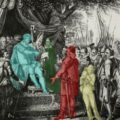Exodus: Yitro: Jacob, June 23
This piece first appeared in Jewish Currents.
"Everyone will readily agree that it is of the highest importance to know whether we are not duped by morality."
—Emmanuel Levinas, Totality and Infinity
Yitro
Exodus 18 - 20
Brooklyn, NY
Hi friends,
Yitro, the fifth parsha of Exodus, includes some of the most iconic scenes in the Bible. The Israelites arrive at Sinai to receive the Torah. They assemble at the foot of the mountain. Moses ascends and returns with the tablets, the beginning of all of Jewish law. It is the parsha in which God begins to show us how to live.
For biblical commentators, however, Yitro poses a significant problem, one first identified by the Talmudic sage Rav Avdimi bar Chama. At this pivotal moment at Sinai, according to bar Chama's influential reading, the Israelites do not in fact choose the Torah. They receive it, but have no choice in the matter; if they had refused, God would have killed them. The Hebrew word "tachtit" can be colloquially read to suggest that the Jews stood "at the base" of the mountain. But bar Chama interpreted the term more literally to mean that the Jews in this parsha were under Mount Sinai: God "held the mountain over them," he claimed, "like a barrel." In bar Chama's account, the message from God was clear: "If you accept the Torah, good, but if not, here will be your graves." Naturally, given these options, the Israelites acceded to the Law.
Following bar Chama, major rabbinic figures took the coercion at Sinai as a serious theological problem. The fact that the Israelites did not actually agree to the Torah adds a "large caveat," the 11th-century sage Rashi said, to all of Jewish law: It meant that any Jew held accountable to that law could claim that "our acceptance was coerced [and therefore null]." The Talmud records various attempts to deal with this riddle. Rabbi Acha bar Yaakov finally concluded that the terms of the lawgiving in Yitro didn't matter because the Jews freely accepted the Torah later, during the drama of Purim. No scholar, to my knowledge, has proposed an explanation for the lawless centuries in between.
Perhaps the most famous contemporary attempt to reckon with the problem of the looming mountain comes from the thinker Emmanuel Levinas, a major figure in 20th-century continental philosophy (at Levinas's funeral in 1995, Jacques Derrida said his work had become "so large one can no longer glimpse its edges"). A Jewish student of Martin Heidegger, Levinas spent much of World War II in a German prisoner of war camp. Afterward, he made it his life's work to develop a new vision of "ethics as first philosophy." Western philosophers have generally distinguished between one set of questions regarding the nature of reality, and a different set regarding how people should behave in the world. For Levinas, however, reality itself—the very fabric of the universe—is produced through our interpersonal relationships, or what he describes in his 1961 work Totality and Infinity as "the primordial phenomenon of gentleness."
Levinas is often read as a secular thinker, but he was deeply influenced by Jewish religious thought and particularly by the long course of Talmud study he undertook with Monsieur Chouchani, a mysterious vagabond and kabbalistic sage whose prominent students also included Elie Wiesel, and whom Levinas sometimes called his "master." One of his several essays on Talmudic questions, "The Temptation of Temptation," focuses on Yitro and the conundrum put forward by bar Chama: What does it mean that the Jews were coerced into acceptance of Jewish law? Levinas universalized this question: What does it mean, he asked, for ethics to be nonconsensual? Levinas came up with a novel answer: The coercion of the Israelites in fact posed no threat to their ethical obligations because, just as we inherit a duty to the Other simply by being born, so were the Jewish people simply given the Torah. In his words, "to receive the gift of Torah—a Law—is to fulfill it before consciously accepting it . . . Not only does acceptance precede examination, but practice precedes adherence." Levinas's interpretation poses a fascinating contrast with Sigmund Freud's reading of Exodus, which Len explained in his letter a few weeks ago. For Freud, the concept of divine chosenness presented in Exodus is a ruse, a story the ancient Jews told themselves to cover up their contempt for the demand that they follow the commandments. For Levinas, on the other hand, chosenness is a way of saying: All life begins with unchoice.
Levinas's interest in the events at Sinai was an extension of his broader philosophy, which centered on the idea that face-to-face encounters between people create the basis for ethical life. When we stand face to face, he argued, we enter into an encounter with the Other—in the broad philosophical sense of all humanity beyond oneself—and are thereby enlisted into ethical responsibility. Even the most disastrous ethical breaches, in Levinas's view, arise from how unrecognizable we are to each other. In a 1981 interview on French radio, he put a fine point on his argument that the human face itself articulates one of the Ten Commandments: "The face is what one cannot kill, or at least it is that whose meaning consists in saying: 'thou shalt not kill.'"
PART OF WHAT'S STRANGE about Levinas's work is just how familiar it is. We can see within it central components of contemporary liberal Jewish thought: a secular understanding of Jewish texts as a cultural heritage requiring reinterpretation, a focus on the ethical questions raised by those texts, and an understanding of ethics centered on one-on-one relationships between individuals. This is more than a mere resemblance: Levinas has been a major influence on contemporary liberal Jewish thought. Cool rabbis blog about him; he has been compared to Abraham Joshua Heschel, the famous 20th-century American rabbi and civil rights activist. Levinas's thinking represents the most radical expression of ideas at the core of modern American Judaism: submission to God replaced with submission to ethics. Contemporary liberal Christian thinkers in Europe, Latin America, and the United States have also been deeply influenced by Levinas's writings—understandably, given that for Christians, as the Gospel of John tells us, "God is love." As the Christian theologian Glenn J. Morrison put it in a 2008 essay on Levinas, "Trinitarian praxis is being sensitive, open and intent enough to love our neighbour."
Yet there is an obvious gap between these theological conversations and the way that Judaism and Christianity function as material, political forces in the world. A glance at the Christian right's stances on queer people or pregnant women, for instance, reminds us that the centrality of love to Christian thought hardly resolves the question of the boundaries of that love. ("All who do not love God are strangers and antichrists," Saint Augustine wrote.) Who does God's love include, and who is excluded from it? It's easy to see the appeal of the Levinasian intervention into our Jewish communal politics; trying to love individual Palestinians is a lot easier than trying to end the occupation. A mainstay of liberal Zionist work, for instance, is Israeli-Palestinian "dialogue" facilitated by organizations that purport to help occupiers and the occupied see across the social barriers that divide them, without doing much about the legal and physical barriers that create the division in the first place. For Levinas, as well, recognition had its limits. Much has been written about whether or not he understood women and Palestinians to have "faces," and therefore a claim on the ethical obligations of others. In another French radio interview—this one in 1982, shortly after the Sabra and Shatila massacre—the philosopher notoriously excused Israeli authorities for their complicity in the deaths of thousands of Palestinian refugees. "The Other," for anti-colonial philosophers like Frantz Fanon, referred not just to other people in general but specifically to subjugated people whose oppressors deemed them less than human. It should worry us that Levinas, in some instances, seems to have recognized only faces that looked like his.
When we take one-on-one relationships as the basic unit of social life, structural power relations—racism, production, policing—fade in importance. The problem, it comes to appear, is that we're simply not nice to each other. But the argument that the answer is a mystical turn toward our fellow humans leaves politics, and those awaiting liberation, behind. The result is what Richard Cohen, in his book Ethics, Exegesis and Philosophy, called "a morality for the elite." Cohen intended this as praise, but I don't see it the same way. For most people in the world, the problem isn't that they aren't seen clearly—it's that they are imprisoned, or occupied, or toiling to produce goods for someone else's profit. Even as Levinas offers a powerful command to look the Other in the face, he invites the privileged to turn away from questions of what the freedom of others might require them to sacrifice.
Today, the mountain still looms over us. But it's not Sinai. It is, as another influential, semi-mystical Jewish thinker wrote, the "wreckage upon wreckage" of our world. This is our inheritance: The many serve the few, human beings are forced to live outside, workers are sent to die in hospitals and mines and factories. A world in which we can give up politics and focus on being nice is at least one revolution away; in utopia, we will delight one another with boundless kindness. But we must win a time when loving will be our most pressing concern—or here will be our graves.
Love and solidarity,Jacob
ALSO IN THIS SERIES
Slow Burn, Quarantine Ed.: The Book of Exodus Introduction
Slow Burn, Quarantine Ed.: Exodus: Shemot: Dan, April 25
Slow Burn, Quarantine Ed.: Exodus: Vaera: Len, May 6
Slow Burn, Quarantine Ed.: Exodus: Bo: Briallen, May 21
Slow Burn, Quarantine Ed.: Exodus: Beshalach: Omari, May 27
Slow Burn, Quarantine Ed.: Exodus: Mishpatim: Sarah, June 23
Slow Burn, Quarantine Ed.: Exodus: Terumah: Carina, August 11
Slow Burn, Quarantine Ed.: Exodus: Tetzaveh: Pratima, August 11





